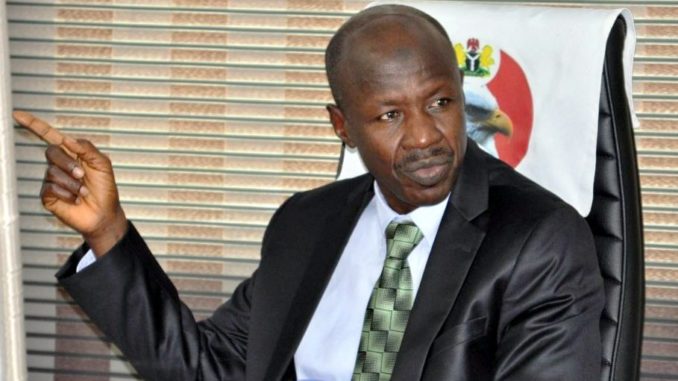
APPREHENSION is mounting in the polity over the activities of the Economic and Financial Crimes Commission as it concerns the credibility of the 2019 general election. Matters got out of hand at the weekend when the EFCC moved against some leading members of the Peoples Democratic Party, which is seen as the strongest opposition to President Muhammadu Buhari’s second term bid. Those caught in the offensive included Doyin Okupe, the spokesperson for the party’s presidential campaign, and the sons of Abubakar Atiku, the PDP’s presidential candidate. More than anything else, this is an indication that the anti-corruption agency is not operating independent of the incumbent government. The trend is terrible for the election and harmful to our democracy.
EFCC officers who stormed Okupe’s house accused him of “hate speech” and “cyber-stalking.” Almost simultaneously, the government also froze the accounts of Peter Obi, Atiku’s running mate, his family members and associates, according to media reports. Coming close to the elections, the action smacks of intimidation, misuse of power and persecution. The EFCC reportedly raided the home of Atiku’s sons in Abuja. Although Atiku’s sons – Aliyu and Mustapha – are said to be studying overseas, EFCC officials forcibly searched the house, alleged Atiku’s spokesperson, Paul Ibe. However, the EFCC strongly denied that it arrested Atiku’s sons or raided their house on Monday. Tony Orilade, the agency’s spokesperson, said officers were only after the sons of Theodore Orji, a former Abia State governor.
The invitation of Okupe is only the latest in a string of incidents that tend to give credence to the belief that security agencies, especially the EFCC, are deliberately targeting the opposition. In another case of blatant harassment, the EFCC had frozen Benue State Government accounts immediately the Governor, Samuel Ortom, announced his defection from the ruling All Progressives Congress to his former party, the PDP. The same fate befell the Akwa Ibom State Government immediately a former governor, Godswill Akpabio, now a serving senator, decided to dump the PDP, where he was the Minority Senate Leader, and pledged his loyalty to the APC. These are more than mere coincidences.
Buhari should draw a line between fighting corruption and intimidation of the opposition. It is a very dangerous game to play as it would raise a very big question mark over the credibility of the elections next year. It should be made clearly known that a free and fair election is not just what is served and delivered on Election Day; it is the totality of the process leading up to the election and the verdict of the people. A continuous crackdown on the opposition will only show the government as dictatorial and intolerant of dissenting views; it will cast a doubt on Nigeria’s democracy.
Buhari has to show the world that he is not behind the various forms of harassment. Otherwise, an overzealous EFCC boss that seems to be doing his master’s bidding will make it seem like his actions have an official seal. For instance, one would expect that the EFCC would act on the allegations of bribery against the pro-Buhari Kano Sate Governor, Abdullahi Ganduje. But nothing seems to be happening. The EFCC has to show the world that it is above board. It is an agency that should be neutral and its boss is not supposed to be seen anywhere near the welcome party of the President at the airport whenever the latter is returning from a foreign trip.
The crippling culture of deploying security agencies in the service of partisan interest must stop to enable democracy to develop roots. This infamy was in evidence in August when masked operatives of the State Security Service took over the premises of the National Assembly in an overt incursion into the political fray, an act that prompted the dismissal of the agency’s head by the then acting President, Yemi Osinbajo. In their over-zealousness to please Aso Rock, police too have raided the houses of the Deputy Senate President, Ike Ekweremadu, and Ijaw leader, Edwin Clark, based on false tips. By their missteps, they have brought the institutions into disrepute, weakened capacity building and fostered impunity.
Buhari should not make the EFCC a partisan tool. Power holders are supposed to act for the common good and against their self-interest. The agency should be independent and publicly accountable. To be seen as apolitical, the EFCC must demonstrate the courage and capacity to prosecute all, including the powerful, without fear or favour. Regrettably, on the eve of another general election, the anti-graft agency and other security agencies appear to have transmogrified into attack dogs against the opposition. In a recent study, Transparency International said, to be effective and earn public trust, the independence of anti-corruption agencies should be ensured, in terms of the selection and appointment of their leadership and staff; the law must grant them extensive powers to investigate, arrest and prosecute and should be allowed full freedom to discharge their legal mandate impartially, without interference from any quarter.
Government agencies must avoid the blind partisanship of the past. The recent pronouncement and deeds of Ibrahim Magu, the acting Chairman of the EFCC so far are far from the ideal and are likely to foul the electoral process. And it bodes ill for the integrity of the outcome of the 2019 polls. The President, who has seized the opportunity of every foreign trip to project his personal integrity and to reassure the international community of his administration’s commitment to the conduct of free, fair and credible elections, should put Magu on the leash. He should not be oblivious of the fact that one election brought him to power in 2015.
END

Be the first to comment